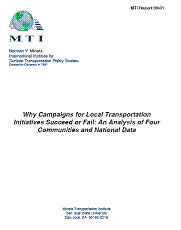- 408-924-7560
- mineta-institute@sjsu.edu
- Donate
Why Campaigns for Local Transportation Initiatives Succeed or Fail: An Analysis of Four Communities and National Data
As funding from state and national sources has dwindled and demands for relief from traffic and congestion have grown, local governments and transportation agencies are increasingly left to develop their own sources of enhanced revenues. Frequently the bid to increase available revenues comprises a local ballot measure, enabling the citizens served by these governments and agencies to express their preferences for or against increased taxation in support of an improved transportation system. What determines the success of campaigns in support of such ballot measures? To answer this question, this report includes the use of two different approaches and data sources.
1) A statistical analysis of community-level characteristics. Data from localities across the nation, as well those within the state of California, that have conducted elections for transportation tax increase are analyzed to determine what factors seem to affect the outcome of such elections.
2) Case studies of four communities that recently conducted elections for transportation tax increases (Santa Clara and Sonoma Counties in California, and the Denver and Seattle metropolitan areas). The case studies allow for in-depth, qualitative understanding of what election strategies and other campaign elements comprise successful or unsuccessful efforts to raise local revenues.
Among the most significant findings from the statistical analysis of local elections were the following:
Efforts to fund transportation with taxes where the proportion of elderly is greater than 9 percent are more likely to succeed In communities where the percentage of elderly is greater than 9 percent, the analysis indicates that voters may be more willing to accept local transportation taxes. However, in communities where the percentage of elderly is less than 9 percent, transportation measures may require significantly more determined marketing to enhance the probability of passage.
Efforts to increase sales taxes for transportation programs will be less successful in communities with higher sales taxes.
A relatively strong and negative relationship between sales tax and support for transportation tax initiatives was identified in the national election data. This suggests that communities with relatively higher sales taxes will be hard pressed to convince citizens to support additional increases.
PETER HAAS, PhD, PRINCIPAL INVESTIGATOR
Peter J. Haas is a Professor in the Department of Political Science at San José State University. The author or numerous scholarly and professional articles, he recently co-authored a text on policy research and was team leader for the 1998 Mineta Transportation Institute publication, Capital versus Operating Grants for Transit: Economic Impacts for California.
KRISTEN SULLIVAN MASSEY, MPP
Kristin Massey recently earned a Masters degree in Public Policy with a concentration in transportation from the University of California, Los Angeles. She also has a Masters Degree in Applied Cognitive Psychology with an emphasis in driver behavior from the Claremont Graduate University. After her participation in the current research was complete, she accepted a position with the Office of Inspector General in the U.S. Department of Transportation.
LINDA O. VALENTY, PhD
Linda O. Valenty is Assistant Professor of Political Science at San José State University. Dr. Valenty’s research has focused upon public policy (including environmental, telecommunications, and transportation policy), psychological profiling, behavioral prediciton, and conflict resolution.
RICHARD WERBEL, PhD
Richard Werbel is a Professor of marketing at San José State University. Prior to his current focus on transportation, he conducted research in a number of application areas, generally research methodology. He has published numerous articles and papers including some that have received outstanding paper awards.
-
Contact Us
San José State University One Washington Square, San Jose, CA 95192 Phone: 408-924-7560 Email: mineta-institute@sjsu.edu






